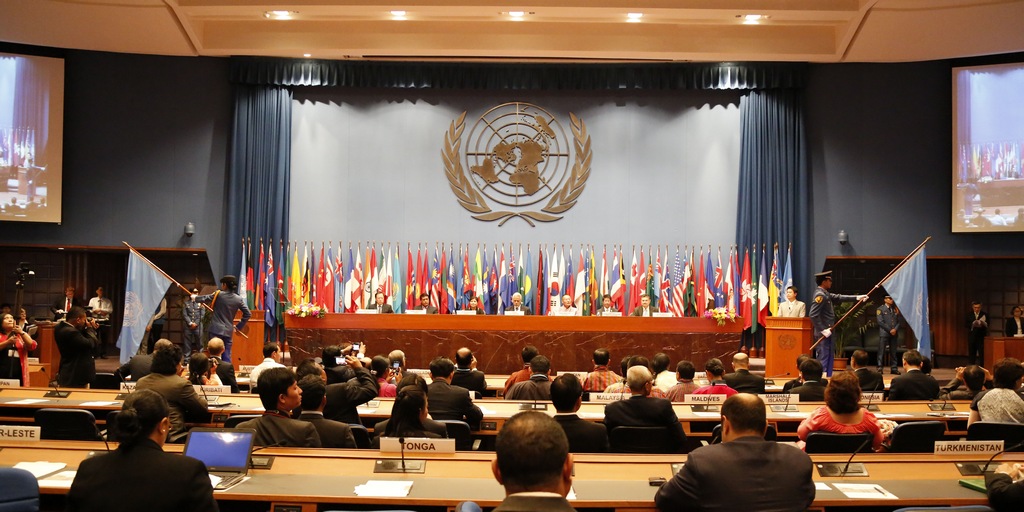UN Policy Forum Opens with Regional Connectivity for Shared Prosperity a Prime Goal for Asia-Pacific
UN Asia-Pacific Chief calls for sustainable, inclusive and job-generating growth

The United Nations Economic and Social Commission for Asia and the Pacific (ESCAP) opened its 70th annual session in Bangkok today with its gaze fixed firmly on the decades ahead as the Executive Secretary outlined a range of priorities for inclusive growth and regional sustainable development in the post-2015 development agenda.
Speaking at the opening, United Nations Under-Secretary-General and ESCAP Executive Secretary, Dr. Shamshad Akhtar said: “With little more than 500 days left to the end of the 2015 deadline for achieving the Millennium Development Goals (MDGs), no region has done better than Asia and the Pacific. But with 743 million Asia-Pacific people still desperately poor, there is no room for complacency.”
“The key to closing our development gaps and achieving our development goals is economic growth,” Dr. Akhtar added. “But we cannot afford growth at any cost. To build the future we want, growth must be sustainable, inclusive and job-generating.”
Addressing the session’s theme of ‘Regional Connectivity for Shared Prosperity’, United Nations Secretary-General Ban Ki-moon stressed in his statement, delivered by Dr. Akhtar: “Boosting connectivity across Asia and the Pacific will enable countries to optimize their strengths and synergies, supporting sustainable development and shared prosperity.”
Dr. Akhtar emphasized that Asia-Pacific’s economic dynamism to date had been primarily driven by individual economies, but that future success would depend on the extent to which the countries of the region were able to integrate and cooperate for sustainable development.
“Enhancement of regional connectivity across the Asia-Pacific region requires political will and cooperation, to explore what is achievable and optimal, to develop consensus on conductive approaches and how we engage, and to put in place a game plan for how this will be achieved,” stated Dr. Akhtar.
ESCAP’s 2014 theme study advocates a more integrated and transformed approach to connectivity as a regional public good, and calls for exploiting the interdependence and synergies of five elements constituting the new drivers of Asia-Pacific growth: trade and transport networks; ICT networks; energy networks; people-to-people networks; and promotion of knowledge-based economies.
Inaugurating the 70th ESCAP Session, Deputy Permanent Secretary for the Ministry of Foreign Affairs of Thailand, Mr. Manasvi Srisodapol also reflected on the theme: “Only through regional connectivity can wealth and development be spread from region to region which is why the work of ESCAP is so critical to member States in the Asia-Pacific region.”
In opening remarks, Prime Minister of Bhutan Lyonchhen Tshering Tobgay and Chairman of the 70th Commission session, highlighted the complexity of challenges faced by the region and the timeliness of the subject under consideration. Advocating for a paradigm-shifting integrated approach toward regional connectivity for attaching a future of shared prosperity, he recognized ESCAP’s theme study as a useful basis for agreeing on a road map to strengthen shared linkages.
Similarly, in opening statements, the Prime Ministers of Timor-Leste, Kay Rala Xanana Gusmão and Tonga, Lord Tu’ivankano expressed support for ESCAP, while stressing the importance of regional connectivity and shared prosperity.
In line with this, the Executive Secretary also highlighted the persistence of inequality: “Inequalities jeopardize the social cohesion and stability of societies. The “inequality trap” risks intensifying social exclusion and creating a group of the “bottom billion” that would be left behind.”
To reduce inequalities of outcome and opportunity, Dr. Akhtar advocated a combination of measures in the region, in particular redistributive policies, the enhancement of social protection, and the promotion of productive and decent work, especially for youth.
Dr. Akhtar ended with: “Shared prosperity calls for shared responsibility and shared accountability.”
More than 30 senior leaders from more than 40 member States in the region are attending this week’s session.
